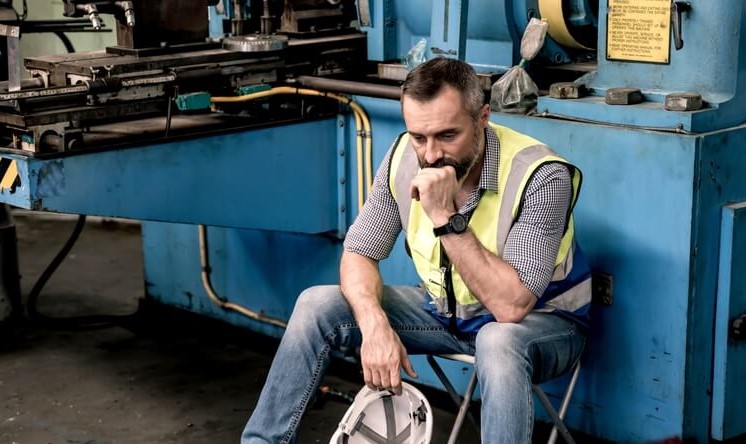Manufacturing has long been an industry likely to have increased rates of anxiety and depression among workers. Research published by Social Psychiatry and Psychiatric Epidemiology found that manufacturing workers are 36% more likely to have mental health problems than those in other industries. That manifests as severe challenges for employees, who often don't get the support they need, and employers, who see negative effects on employee retention and often struggle because they don't have the tools to help their team. However, taking steps such as making mental health an accessible topic in the workplace and other changes can address many of the mental health concerns in the industry.
Keep reading to see how manufacturing workers face unique stressors and the role your HR team can take to both protect your workers and create a supportive company culture.
The Unique Stressors of Manufacturing
The manufacturing sector requires work environments that are uniquely stressful compared to many other sectors. They all contribute to a stressful work cycle from when people first clock in – to when they leave for the day. These factors include:
- Constantly noisy machinery
- The ongoing presence of extremely dangerous equipment and vehicles
- The potential handling of hazardous materials
- Hours of repetitive tasks
The work itself may even be scheduled at night, further contributing stress through misalignment with circadian rhythm and a disconnect from social support outside of work. Even inside a manufacturing facility, social support is low because casual chatting may be impossible with the noise of the machinery and completely solitary tasks.
These stressors combine with other challenges slightly less unique to the manufacturing sector, such as financial stress, inflation, worries about job loss, and more.
However, many generally available mental health resources are not built for manufacturing workers' needs. They often focus on office settings, corporate structures, or individual approaches to work-life balance and mental health. While many organizations like yours may know that workers face challenging mental health situations, you may not have the tools to address the problem or provide support to help your teams. That, in turn, can increase stressors for everyone involved.
How HR Helps to Improve Mental Health
Your HR professionals will play a pivotal role in changing the course of mental health initiatives (and results) in your organization. Prioritizing the right initiatives, cultural foundations, and benefits plans can help significantly address your workers' mental health concerns. Demonstrating care, creating concrete and actionable best practices, and making mental health a more approachable topic all make a difference.
Create a Culture of Connection
First, create a stronger company culture that builds stronger interpersonal ties between workers and with your company. When employees feel like a team instead of disconnected workers performing tasks in isolation, this can drastically reduce loneliness, disconnect, and lack of engagement. Consider steps such as:
- Regularly and authentically showing appreciation
- Discussing company-wide initiatives and showing how different parts of the company affect each other
- Create stronger connections between workers and managers so workers feel more comfortable reaching out for support or providing feedback
Establish Mental Health Best Practices
Unfortunately, mental health can still feel like an untouchable topic. There is a pervasive stigma against people who suffer from mental illness or seek help for mental health. This trend is stronger amongst male populations and can be even stronger in primarily male workforces, such as manufacturing, where 67% of workers are men. Your HR team and managers must proactively establish best practices and start conversations to prevent these issues.
One strategy for providing information and actionable policies is implementing wellness programs. Encourage participation so your employees can provide self-care and support their well-being. Different self-care aspects can include exercises or stretches that mitigate the risk of injury from repetitive stress or heavy loads, nutrition improvements, and prioritizing sleep (especially for night-shift teams).
Support Work-Life Balance
One of the best ways to support work-life balance is to provide clear PTO policies and ensure workers can take all their time off by the end of the year. PTO is a versatile tool that allows employees to spend time with their families, recover from hard shifts, or take mental health days. When your team has a straightforward PTO policy, you implement real-time tracking processes so everyone knows how much time they have. Employees will feel more comfortable using their PTO based on their individual needs to establish a better work-life balance.
Train Managers to Recognize When Employees Are Struggling
A critical aspect of management in any sector is knowing when employees need additional support. Instead of solely providing passive resources and policies, your management team should also actively recognize when employees may be struggling with their mental health. That requires training in mental health first aid, so managers can recognize common signs of mental health struggles, approach employees properly, and consistently support everyone on their team.
By no means should managers be expected to administer aid and care – that should solely be the responsibility of medical professionals – but they can pick up on crucial warning signs and adjust workloads or bring in help when necessary.
Develop a Mental Health Support System for Your Manufacturing Employees
These steps can set the foundation for improved mental health in your manufacturing organization. However, if your facility is concerned or confused about implementing these new strategies, they can seek outside help to support their HR team. A PEO can help you get started by creating or revising your company policies, providing training or mental wellness resources, and other things, such as improved employee benefits or payroll support. Turning to a qualified PEO with experience in serving manufacturing companies will enable your team to address mental health more readily.


